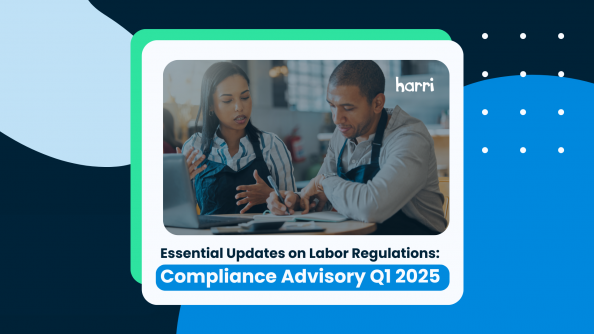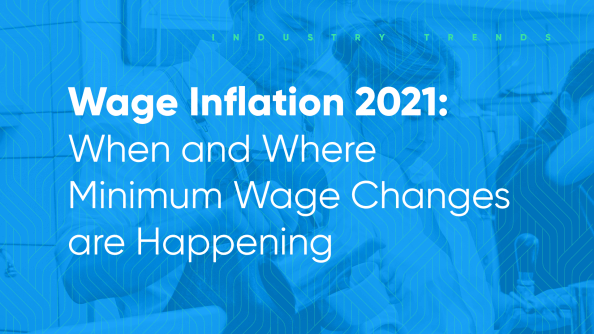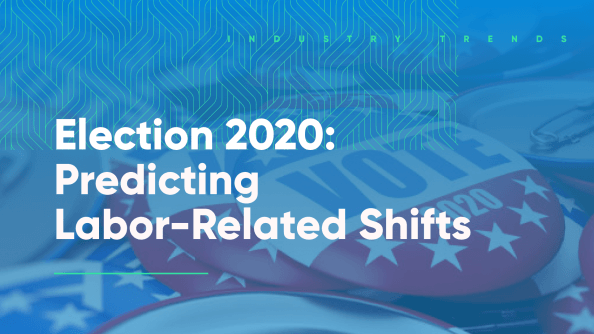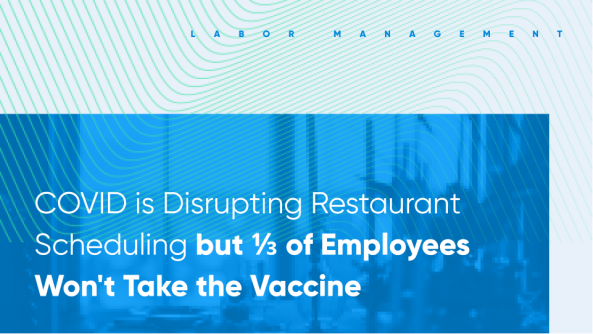5 Reasons Why Scheduling Matters Like Never Before

- By Harri Insider Team | February 26, 2021

Luke Fryer
CEO & Founder, Harri
When people in the restaurant industry think about scheduling, some may just dismiss it as something tactical and less important to success than great food or an incredible experience. That’s a huge mistake. Scheduling is the scaffolding for success with front-line workers. If you succeed here, you’re going to succeed across the ecosystem — starting with employee satisfaction, extending into customer experience, and ultimately impacting revenue and profit margins.
Of course, there’s another reason to dismiss scheduling as less important: It’s really, really hard to do well. Employees are constantly juggling shifts, maybe trying to pick up more hours or get a certain day off. Then someone gets sick or doesn’t show up. It’s a constantly changing experience with lots of moving parts. There’s no silver bullet, so it’s easier not to think about it.
But you have to think about it. Scheduling is the number one reason for employee turnover and dissatisfaction. And, of all the levers you can pull to increase productivity and profitability, scheduling is the one that can have the greatest impact. So what do you do?
Better technology is the only solution. The old way of managing schedules was really just about telling people when to work and maybe where. Today, restaurant industry employers need to accommodate multiple business aspects, including logistical, operational, commercial, compliance, and the employee experience. Scheduling matters more than ever — and better scheduling technology is essential — for these five reasons:
Reason No. 1: You Need Reliable, Accurate Labor Forecasting
Labor forecasting is a blend of art and science that always seems like a struggle to master. You always need a firm grip on your demand curve to understand labor needs and meet service demands. Scheduling brings more data to your decision-making and improves the accuracy of your forecasts. How do managers benefit from increased forecasting accuracy?
- Scheduling proactively based on what happened in the past: Leverage historical sales, demand forecasting, and activity-based intelligence to inform the precise labor needed in a given day or week.
- Generating the optimal labor mix to maximize sales: Leverage historical sales, activity-based methodology, and demand forecasting to drive accuracy and efficiency for your unique concept, location, or brand.
- Bringing outside data into the scheduling equation: Tap into catering, reservation, weather, event, and localized data to better inform sales and labor adjustments.
Best of all, better scheduling technology can save managers hours in administrative work required to build the schedules that drive optimal economics and performance. Even new managers can be more effective at forecasting with the scheduling insights that are available.
Reason No. 2: Scheduling Managers Need to Adjust Forecasts and Track Success Over Time
With any software application, ease of use and a great experience are always important considerations. With scheduling software, it’s important to offer the end user (your employees) a great experience. But don’t forget your managers. Better scheduling software creates a great experience not just because it’s easy to use; it also helps managers be better at their jobs as they interact with system-generated formats. How do managers benefit from intuitive, easy-to-use applications and become more effective?
- Gaining a tactile understanding of day-to-day business: It’s easier to get a feel for the business when manager-generated schedules are overlaid with a system-generated schedule. Here, you can identify broad-scope labor trends, as well as areas where you think you may be performing well but in actuality are understaffing operations.
- Learning through system guidance: With increasing regulations around wage and hours requirements, system guidance can help proactively manage compliance efforts. Managers find it easier to learn as they monitor and define each week’s anticipated shifts to ensure accurate labor hours and costs.
- Tracking the efficacy of the managers’ forecasting process: Businesses make significant investments based on forecasts. Are some managers getting it right more often than others? Knowing the answer will help you see a new dimension to manager performance and see success over time.
Reason No. 3: Forecasting Informs a Labor Matrix
One of the downfalls of traditional scheduling is the inefficiency of it. Sometimes you end up over-scheduling or under-scheduling employees based on anticipated needs. A lot of the labor mismatch comes from an inability to be granular in the scheduling process. For example, you schedule a server for a full shift and cut them if there’s not enough to do. Better technology improves managers’ ability to fine-tune labor needs and control costs as forecasting informs a labor matrix for your business. How does it do that?
- Breaking down schedule segments into small increments: Scheduling managers can get very granular as they break down dayparts into increments as short as 15 minutes.
- Producing optimal shifts through the working day: Getting the right mix of shifts by employee position and for every unit of time no longer requires constant manager supervision. Shift management rules can make things more “set it and forget it” by configuring and defining shift-related rules for clocking in and out, flexible shifts, and employee-driven swaps.
- Developing workable, one-off exceptions: Intelligent scheduling makes it easier to template events such as holidays. Managers can efficiently weave in exceptions so that optimal staffing and shift coverage avoid common headaches and conflicts that arise.
Reason No. 4: You Need to Produce Optimal Shifts and Assign Best-fit Employees Into Each Shift
Your best people make a difference in your business. A great server not only creates a great experience, they know how to upsell and turn tables. A great expediter can improve kitchen efficiency that not only creates happy customers, but decreases waste. Taking into account availability and skills is essential for intelligent scheduling, but it’s almost impossible to do without the right technology. How do scheduling managers benefit from assigning the right employees at the right time?
- Getting aces in places: Understanding employee qualifications in the scheduling process is vital to ensure that you have the right people in the right places at the highest point of demand.
- Scheduling automatically: Scheduling can be a huge time suck for managers who already have so much on their plates. Automatic scheduling makes it easier to get the ideal labor mix so they can focus on creating the best possible customer experience.
Creating equity and engagement in schedules: The golden rule of shift scheduling is this: Your best employees get the best shifts. Intelligent scheduling makes it easy to give your top-performing employees better shifts, which is a valuable tool for motivation and retention.
Reason No. 5: Scheduling Must Be Efficient, Effective, and Flexible
The benefits of better scheduling technology are more than just aligning schedules to forecasts or with putting the right people in the right places at the right time. Scheduling is a dynamic process. The last mile is publishing and communicating schedules to employees in a user friendly and effective way. Also, scheduling must allow flexibility to adjust in a way that suits the needs of employees and the business while tracking compliance around changes. Better scheduling technology can make everything more efficient, effective, and flexible. How?
- Offering interactivity to roll with reality: To say that restaurant life is full of changes is an understatement. It’s also just acknowledging reality. A flexible, easy, user-friendly scheduling app for employees makes shift swapping, PTO requests, and other drivers of employee satisfaction far easier.
- Making scheduling mobile with minimum effort: Everyone lives on their mobile phone. Intelligent scheduling connects with mobile apps so managers and employees can make changes, check availability, get alerts, and communicate on the go.
- Keeping compliance front and center: As important as scheduling flexibility is for employees, intelligent scheduling never forgets you have a business to run. Ensuring scheduling occurs within established frameworks help managers stay on top of hours, overtime, consecutive workweek dynamics, and minimum wage requirements.
Scheduling is core to success in the hospitality industry. Even though COVID-19 has cut staffing and created an operational nightmare for many restaurants, it’s important to be ready when business comes roaring back.
The best-performing industries in all types of distributed workforce industries are making a significant investment in scheduling tech. Some of these changes may be reactively for compliance and legal reasons. But more and more employers are doing so proactively to improve business efficiency and operations on a day-to-day basis, as well as create the type of employee experience necessary to compete for the best talent.
Will you be ready? Intelligent scheduling is no longer a nice-to-have, it’s a must-have. If you want to make better scheduling technology a driver of optimal profitability without the frequent disruptions of compliance on a day-to-day basis, let’s talk. Harri’s integrated approach to intelligent scheduling can put you in the best position for success in 2021 and beyond.




















